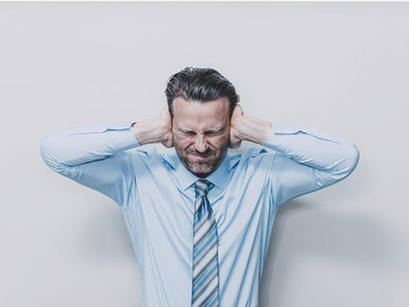Tinnitus refers to the perception of noise or ringing in the ears and affects 32% of the American population as well as a disproportionate amount of veterans. Usually, tinnitus is a symptom of an underlying condition such as hearing loss, ear injury, or a circulatory system disorder. Although it can lead to impairment in everyday life, it is not life-threatening. In some cases, the phantom noises can also interfere with the person’s ability to hear external sounds. The most common tinnitus symptoms include phantom noises in the ear such as:
● Ringing
● Buzzing
● Roaring
● Clicking
● Hissing
● Humming
Secondary Conditions To Tinnitus
Tinnitus can cause significant disability in veterans’ everyday life and oftentimes results in several other conditions as well. The most common of which are:
Depression Secondary To Tinnitus
Depression is a serious health condition that affects the way a person thinks, feels, and acts. Symptoms of depression vary person-to-person; however, common symptoms are:
● Persistent feelings of sadness, worthlessness, and hopelessness
● Lack of motivation or interest in activities that usually derive pleasure
● Difficulty sleeping and concentrating
● Change in appetite resulting in weight loss or weight gain
● Irritability
● Fatigue
A 2015 study titled “The Correlation of the Tinnitus Handicap Inventory with Depression and Anxiety in Veterans with Tinnitus” looked at the percentage of veterans with tinnitus who also suffered from depression and found that 58.2% of the sample (91 veterans that had a tinnitus diagnosis) has depression. Basically, tinnitus causes complications with sleep which leads to stress, fatigue, and in the end, depression.
Anxiety Secondary To Tinnitus
Anxiety is defined as intense, excessive, and persistent worry and fear about everyday life. 40 million adults aged 18 or older (18.1%) suffer from anxiety disorders in America every year. The most common symptoms of anxiety disorder are:
● Feeling restless, jumpy, or on edge
● Excessive worrying
● Difficulty concentrating
● Rapid heartbeat
● Trembling or twitching
● Muscle tension
● Shortness of breath or difficulty breathing
● Feeling dizzy, nauseous, or lightheaded
● Difficulty sleeping
The study referenced above found that 79.1% of the sample also suffered from anxiety and 58.2% of the sample suffered from both anxiety and depression.
Sleep Apnea Secondary To Tinnitus
Sleep apnea is a serious sleep disorder in which a person’s breathing is constantly interrupted during the night. There are 3 types of sleep apnea: 1) Obstructive Sleep Apnea; 2) Central Sleep Apnea; 3) Complex (mixed) Sleep Apnea. The most common symptoms of sleep apnea are:
● Loud snoring
● Gasping for air during sleep
● Awakening with a dry mouth
● Morning headache
● Insomnia
● Hypersomnolence (excessive daytime sleepiness)
● Difficulty concentrating
A study assessed the prevalence and severity of sleep disturbance in chronic tinnitus patients, among the patients, 80% were military personnel with a diagnosis of tinnitus associated with noise-induced permanent hearing loss. Mini Sleep Questionnaire scores for sleep disturbance were higher than those of normal control in 77% of the patients. The highest MSQ score was for delayed sleep, morning awakenings, mid-sleep awakenings, morning fatigue, and chronic fatigue.
Migraine Headache Conditions Secondary To Tinnitus
Migraine headaches are a type of headache distinguished by intense pain that can be accompanied by nausea, vomiting, sensitivity to light and sounds, lightheadedness, and blurred vision. Migraines can be weakening and can last from hours to days depending on the person. No one is sure about what causes migraine but common triggers are hormonal imbalance, alcohol, stress, and sensory stimulation (e.g., tinnitus). According to the American Migraine Foundation, there is a strong relation between tinnitus and migraine headaches. 27% of people that have tinnitus also suffer from migraines. Some people also report worsening of their tinnitus symptoms during migraines.
If you need help getting a service connection please contact us or book an appointment with a claim specialist.

